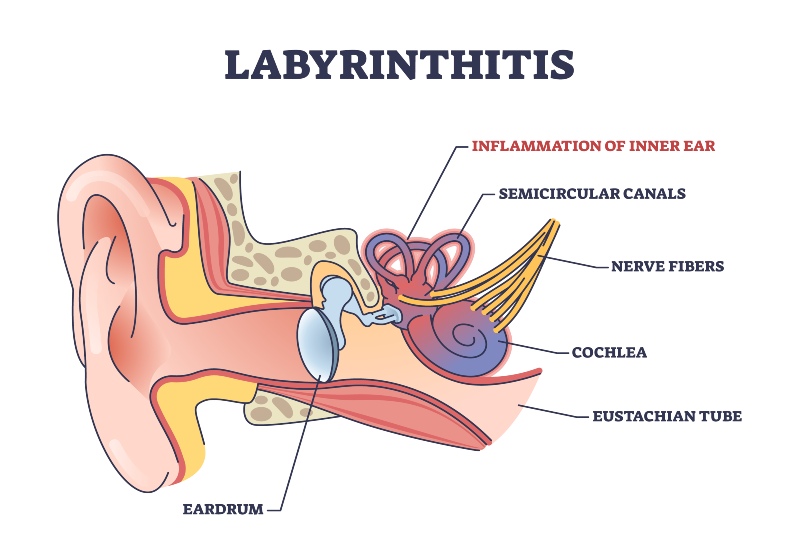Labyrinthitis
Our Team Specializes in Labyrinthitis in Castle Rock, CO
Labyrinthitis can turn your world upside down. This inner ear condition affects your balance and hearing, making simple daily tasks feel impossible. If you’re experiencing dizziness, hearing loss, or feeling like the room is spinning, rely on Castle Rock Ear Associates for care. We specialize in diagnosing and treating labyrinthitis at our clinics in Douglas County, CO, helping patients regain their balance and return to normal activities. Let’s explore labyrinthitis, its causes, and how we can help you feel better.

What Is Labyrinthitis?
Labyrinthitis describes a condition in which the inner ear’s labyrinth becomes inflamed. The labyrinth is a small, maze-like structure that helps control your balance and hearing. But when it’s inflamed, it can’t work correctly.
This condition affects two important parts of your inner ear. The cochlea helps you hear sounds, while the vestibular system helps you maintain balance. When labyrinthitis strikes, both systems may stop working correctly. The inflammation disrupts the normal signals your inner ear sends to your brain. This causes the spinning sensation, balance problems, and hearing issues that make labyrinthitis so challenging.
Causes of Labyrinthitis
Several factors can cause labyrinthitis. Understanding them helps doctors choose the best treatment approach.
- Viral Infections – Cold and flu viruses can spread to your inner ear, causing inflammation. Other viruses like herpes simplex and Epstein-Barr virus can also trigger labyrinthitis.
- Bacterial Infections – These infections are less common than viral infections, but they’re usually more serious and may require stronger treatment.
- Allergic Reactions – Reactions to medications or environmental factors can inflame the inner ear. Some people develop labyrinthitis after taking certain antibiotics or other drugs.
- Head Injuries – Even minor bumps can damage inner ear structures. Blows to the head might trigger labyrinthitis symptoms.
- Autoimmune Conditions – Your body’s immune system may attack healthy inner ear tissue, which can lead to chronic labyrinthitis.
What Are the Main Labyrinthitis Symptoms?
Labyrinthitis symptoms can start suddenly and feel overwhelming. The most common signs include:
- Vertigo – You’ll feel like the room is spinning, even when you’re sitting still. This spinning sensation can be mild or severe.
- Balance Problems – You might feel unsteady or like you’re going to fall. Some people must hold onto walls or furniture to move around.
- Hearing Loss – Sounds might seem muffled or distant in one or both ears. Some people experience complete hearing loss in the affected ear.
- Tinnitus – This involves ringing, buzzing, or other sounds in your ear that aren’t real. Only you can hear them.
- Nausea and Vomiting – These problems often occur with severe vertigo. The spinning sensation can make you feel sick to your stomach.
- Eye Movements – Jerky or uncontrolled eye movements, called nystagmus, happen because your balance system isn’t working properly.
How Is Labyrinthitis Diagnosed?
Proper labyrinthitis diagnosis requires several tests. Our doctors start by asking about your symptoms and medical history. We want to know when symptoms started, how severe they are, and what makes them better or worse. Next, we’ll use one or more of the following advanced testing methods to find the exact cause.
- Physical Examination – We’ll check your ears, eyes, and nervous system for signs of infection and test your balance and coordination.
- Hearing Tests – These tests measure how well you can hear different sounds and help us understand if labyrinthitis has affected your hearing.
- Balance Tests – Our doctors will check how your inner ear controls your balance. You might need to walk in a straight line or stand with your eyes closed.
- Blood Tests – Blood tests can rule out other conditions that cause similar symptoms. We might test for infections, autoimmune disorders, or other health problems.
- Imaging Tests – CT scans and MRIs help us see the structures in your inner ear. These tests can show inflammation and other problems.
How We Treat Labyrinthitis
Labyrinthitis treatment depends on what’s causing your symptoms. Castle Rock Ear Associates creates personalized treatment plans for each patient.
- Medications – Anti-inflammatory drugs help reduce swelling in the inner ear, while anti-nausea medications control vomiting and upset stomachs.
- Antibiotics – These drugs fight bacterial infections and reduce inflammation.
- Steroids – We might prescribe oral steroids or inject them directly into your ear to quickly reduce severe inflammation.
- Vestibular Rehabilitation Therapy – Special exercises teach your brain to adapt to changes in your inner ear and retrain your balance system.
- Rest and Recovery – Avoiding sudden movements and getting plenty of sleep help your body heal.
FAQ About Labyrinthitis
We’ve compiled answers to a few of our most frequently asked questions about labyrinthitis below.
You can’t always prevent labyrinthitis, but you can reduce your risk. Treat ear infections quickly before they spread. Practice good hygiene to avoid viral infections and protect your head from injuries during sports and other activities. Most people recover from labyrinthitis within a few weeks. Mild cases may improve in days, but severe cases can take several months to heal. Our labyrinthitis therapy can help minimize your downtime. Vertigo is a symptom of labyrinthitis. Think of it as one piece of the labyrinthitis puzzle, along with hearing loss and balance problems.
Contact Us for Expert Labyrinthitis Treatment
Castle Rock Ear Associates provides expert diagnosis and treatment for labyrinthitis using the latest methods and technology. Our staff will work with you to find the best treatment plan and help you return to your normal activities. Contact us today to schedule an appointment.
